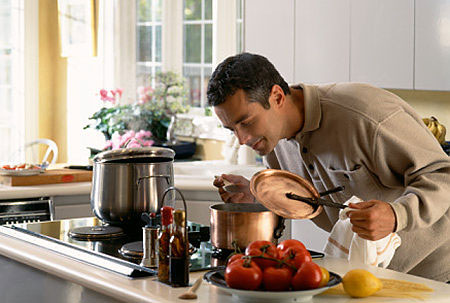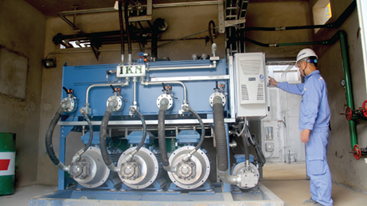Saturday, 27/07/2024 | 10:23 GMT+7
The kitchen is one area in the home where we use a lot of energy, and unfortunately many of us are very wasteful with much of it.There are still simple ways you can help save energy and ultimately, money in the kitchen: just follow these 10 simple ways to get a more energy efficient kitchen but you don’t need to stop there. Why not try to make every room in your house more eco friendly? It will save power AND money
1. Put a lid on it
Putting a lid on a saucepan really does save masses of energy. The lid stops all the steam you are creating from leaving the pan, and makes sure that heat is put to good use cooking the food. Some suggest it could cut the cost of cooking something on the hob by as much as 90%! That only works if you don’t overcook it and turn the heat down accordingly though.

2. Nuke it!
Although they are often considered poor form for cooking, microwaves are actually great for keeping your bills down. They use a fraction of the energy that an oven uses, so if you have something to reheat, or something you don’t mind cooking in the microwave, it will be worth it for your wallet and the planet, too.
3. Eat together
In this day and age the family meal at the end of the day is becoming a thing of the past, but cooking all the food you need at the same time will save energy. Another quick tip – smaller pieces of food cook quicker – dice that chicken up rather than cooking the bird whole, it will cut the cooking time and save energy.
4. Waste not, want not
Using leftovers and cutting your wasted food doesn’t just help save the planet, it also helps keep your bills down too. Less waste means less cooking.
5. Fill it up
Freezers work better when they are filled with stuff. If you don’t have much to put in there, try putting something in there to reduce the space. Defrosting is also really important – make sure you do this regularly to save energy. If you find you don’t use the freezer for much more than ice, just buy a fridge with a small freezer compartment rather than a separate unit.
6. Size your whites
Also remember that as a general rule, a separate fridge and freezer is more expensive to run than a combined unit. Make do with a smaller fridge by picking up fresh food every day, rather than buying a bunch and storing it, American style. You’ll probably also waste less food this way!
7. Cleaner is cheaper
Your fridge and freezer tend to get a big dust build up around the compressor at the back of the fridge – sticking the vacuum round them every now and then will help prevent the compressor from working as hard, keep it running efficiently and extend their life span.
8. Get old fashioned
When doing the dishes, fill the sink and soak the plates before washing, then give them a quick, cold water rinse. If you can’t manage that, dishwashers actually use less hot water and often less energy than doing the dishes by hand if you tend to run the water for ages while you’re doing the washing up.
9. Keep it on a low boil
Kettles seem to be the big thing everyone talks about when it comes to wasting energy – but with good reason. Water in the kettle is being heated by an electric element, and you are heating it far hotter than your boiler heats water, so it is actually really energy intensive.
10. Now you’re cooking with gas!
Whilst you might not be ready for a new oven, cooking with gas is actually a lot more cost effective than electricity. Why? Because the cost of a unit of gas is about a quarter of the price of electricity, so gas is way cheaper to cook your food. A gas hob also helps you control the temperature a lot better as well, so it is a bit of a win-win. If you’re stuck with an electric hob, remember the hob retains heat for far longer than a gas element, so turn it off before the food is fully cooked and use residual heat to finish the job off.
Renewableworld








.jpg?w=367&h=206&mode=crop) Notice for Contracts award for Support to Industrial Enterprises for Energy Audits and Preparation of Feasibility Studies (Package No. C2.2.4)
04/06/2024
Notice for Contracts award for Support to Industrial Enterprises for Energy Audits and Preparation of Feasibility Studies (Package No. C2.2.4)
04/06/2024
 Training Courses for Energy Managers and Energy Auditors
Training Courses for Energy Managers and Energy Auditors
 Vietnam Energy Outlook Report – Pathway to Net Zero
Vietnam Energy Outlook Report – Pathway to Net Zero
 Long Son Cement saves 30% of electricity consumption thanks to heat recovery
Long Son Cement saves 30% of electricity consumption thanks to heat recovery
 Expression of Interest: C2.1.15: Development of Energy-Efficient Technology Catalogs for the Industrial Sector
Expression of Interest: C2.1.15: Development of Energy-Efficient Technology Catalogs for the Industrial Sector
 Optimizing Compressed Air Systems for Southern Industrial Enterprises
Optimizing Compressed Air Systems for Southern Industrial Enterprises
 The Ministry of Industry and Trade Review the Energy Efficiency and Conservation activities in Lao Cai.
The Ministry of Industry and Trade Review the Energy Efficiency and Conservation activities in Lao Cai.
 EOI Extension: C2.2.2: Review and update for current EE benchmarking for 2 sub-industrial sectors
EOI Extension: C2.2.2: Review and update for current EE benchmarking for 2 sub-industrial sectors